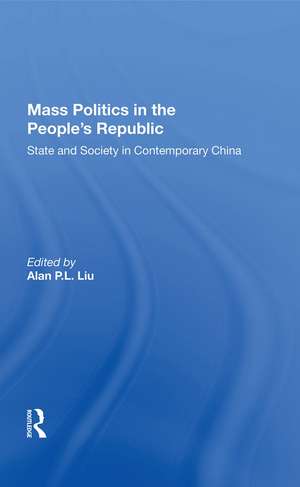Mass Politics In The People's Republic: State And Society In Contemporary China
Autor Alan P.L. Liuen Limba Engleză Hardback – 7 iun 2019
Preț: 764.20 lei
Preț vechi: 1027.40 lei
-26% Nou
Puncte Express: 1146
Preț estimativ în valută:
146.23€ • 152.67$ • 121.02£
146.23€ • 152.67$ • 121.02£
Carte tipărită la comandă
Livrare economică 05-19 aprilie
Preluare comenzi: 021 569.72.76
Specificații
ISBN-13: 9780367004118
ISBN-10: 0367004119
Pagini: 268
Dimensiuni: 147 x 234 mm
Greutate: 0.45 kg
Ediția:1
Editura: Taylor & Francis
Colecția Routledge
Locul publicării:Oxford, United Kingdom
ISBN-10: 0367004119
Pagini: 268
Dimensiuni: 147 x 234 mm
Greutate: 0.45 kg
Ediția:1
Editura: Taylor & Francis
Colecția Routledge
Locul publicării:Oxford, United Kingdom
Cuprins
Introduction: Rise of the Mass in Chinese Politics -- State and the Peasantry -- Workers: Reaction and Ambivalence -- Political Attitudes and Behavior of Students: Cycles of Protests -- Ethnic Separatism -- Conclusion: Public Opinion, Political Culture, and Prospects for Civil Society in China
Descriere
Exploring the crucial link between state and society in the PRC, this study analyzes the interaction between the Chinese Communist Party and the country’s major social groups—peasants, workers, youths and students, intellectuals, and ethnic minorities—since the founding of the People’s Republic. Alan Liu argues that uninstitutionalized public opinion has existed in China ever since the inception of the Communist regime and that it gradually grew powerful enough to thwart Mao’s policies and programs. He contends that the government’s radical post-Mao reforms emerged less from the preferences of another paramount leader—Deng—than from public opinion, which has grown too strong for the communist party either to ignore or control.
